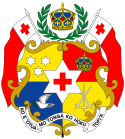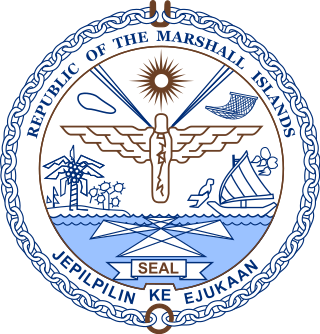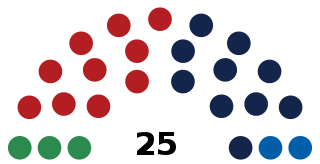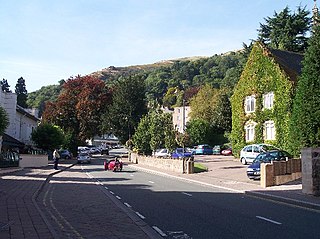 |
|---|
| Constitution |
| Administrative divisions |
General elections were held in Tonga in 1930.
 |
|---|
| Constitution |
| Administrative divisions |
General elections were held in Tonga in 1930.
The Legislative Assembly consisted of seven members elected by commoners, seven elected by the nobility and nine members of the Privy Council (four ministers, four governors and the Chief Justice). The country was divided into three constituencies, with three commoners and nobles elected in Tongatapu and the surrounding islets, and two of each from both Haʻapai and Vavaʻu. [1]
Voting was restricted to men aged 21 or over. [1]
The newly elected Parliament was opened by Queen Sālote Tupou III on 20 August 1930. [2]

A member of parliament (MP) is the representative in parliament of the people who live in their electoral district. In many countries with bicameral parliaments, this term refers only to members of the lower house since upper house members often have a different title. The terms congressman/congresswoman or deputy are equivalent terms used in other jurisdictions. The term parliamentarian is also sometimes used for members of parliament, but this may also be used to refer to unelected government officials with specific roles in a parliament and other expert advisers on parliamentary procedure such as the Senate parliamentarian in the United States. The term is also used to the characteristic of performing the duties of a member of a legislature, for example: "The two party leaders often disagreed on issues, but both were excellent parliamentarians and cooperated to get many good things done."

The Riksdag is the legislature and the supreme decision-making body of Sweden. Since 1971, the Riksdag has been a unicameral legislature with 349 members, elected proportionally and serving, since 1994, fixed four-year terms. The 2022 Swedish general election is the most recent general election.

Sir Lindsay Harvey Hoyle is a British politician who has served as Speaker of the House of Commons since 2019 and as Member of Parliament (MP) for Chorley since 1997. Before his election as Speaker, he was a member of the Labour Party.

The Great Council of Chiefs is a Fijian constitutional body. It previously existed from 1876 to March 2012 and was re-established in May 2023.

The New South Wales Legislative Council, often referred to as the upper house, is one of the two chambers of the parliament of the Australian state of New South Wales. The other is the Legislative Assembly. Both sit at Parliament House in the state capital, Sydney. It is normal for legislation to be first deliberated on and passed by the Legislative Assembly before being considered by the Legislative Council, which acts in the main as a house of review.

The Diet of Finland, was the legislative assembly of the Grand Duchy of Finland from 1809 to 1906 and the recipient of the powers of the Swedish Riksdag of the Estates.
In Ireland, direct elections by universal suffrage are used for the President, the ceremonial head of state; for Dáil Éireann, the house of representatives of the Oireachtas or parliament; for the European Parliament; and for local government. All elections use proportional representation by means of the single transferable vote (PR-STV) in constituencies returning three or more members, except that the presidential election and by-elections use the single-winner analogue of STV, elsewhere called instant-runoff voting or the alternative vote. Members of Seanad Éireann, the second house of the Oireachtas, are partly nominated, partly indirectly elected, and partly elected by graduates of particular universities.

The Parliament of New South Wales is a bicameral legislature in the Australian state of New South Wales (NSW), consisting of the New South Wales Legislative Assembly and the New South Wales Legislative Council. Each house is directly elected by the people of New South Wales at elections held approximately every four years. The Parliament derives its authority from the King of Australia, King Charles III, represented by the Governor of New South Wales, who chairs the Executive Council. The parliament shares law making powers with the Australian Federal Parliament. The New South Wales Parliament follows Westminster parliamentary traditions of dress, Green–Red chamber colours and protocols.

Marshall Islands elects on the national level a head of state – the president – and a legislature. The president is elected for a four-year term by the parliament. The Legislature (Nitijela) has 33 members, elected for a four-year term in single-seat and five multi-seat constituencies. The Legislature was last elected in 2019 without the participation of parties, though part of the members could be members of the United Democratic Party. The Marshall Islands is a state in which political parties have not been active.
The 1927 Manitoba general election was held on 28 June 1927 to elect Members of the Legislative Assembly of the Province of Manitoba, Canada. The result was a second consecutive victory for Manitoba farmers, following its 1922 win.

The National Assembly or Rastriya Sabha is the upper house of the Federal Parliament of Nepal, the lower house being the House of Representatives. The composition and powers of the Assembly are established by Part 8 and 9 of the Constitution of Nepal. There are a total of 59 members: 8 members are elected from each of the seven provinces by an electoral college of each province, and three are appointed by the President on recommendation of the government.

The Legislative Assembly of Tonga is the unicameral legislature of Tonga. The assembly has 26 members in which 17 members elected by majority of the people for a 5-year term in multi-seat constituencies via the single non-transferable vote system. There are 9 members elected by the 33 hereditary nobles of Tonga. The Assembly is controlled by the speaker of the House who is elected by majority of the elected members of Parliament and constitutionally appointed by the king.

The Landtag of the Principality of Liechtenstein, commonly referred to as the Landtag of Liechtenstein, is the unicameral parliament of Liechtenstein.
Sir William Richard Benyon was a British Conservative Party politician, Berkshire landowner and High Sheriff.

The 1954 Australian federal election were held in Australia on 29 May 1954. All 121 seats in the House of Representatives were up for election, but no Senate election took place. The incumbent Liberal–Country coalition led by Prime Minister Robert Menzies defeated the opposition Labor Party led by H. V. Evatt, despite losing the two-party preferred vote. Although the ALP won the two-party preferred vote, six Coalition seats were uncontested compared to one ALP seat. The Psephos blog makes clear that if all seats had been contested, the Coalition would have recorded a higher primary vote than the ALP and possibly also a higher two-party preferred vote.
Early general elections under a new electoral law were held in Tonga on 25 November 2010. They determined the composition of the 2010 Tongan Legislative Assembly.

The Malvern Hills Conservators are a body corporate responsible for the care and management of the Malvern Hills and Commons. They were established in 1884 and are governed by five Acts of Parliament, the Malvern Hills Acts 1884, 1909, 1924, 1930 and 1995. They became a registered charity in 1984 and since April 2017 use the working name of the Malvern Hills Trust.

The city of Glasgow, located in Scotland, UK, is represented in both the Westminster Parliament in London, and the Scottish Parliament in Holyrood, Edinburgh. At Westminster, it is represented by seven Members of Parliament (MPs), all elected to represent individual constituencies at least once every five years, using the first-past-the-post system of voting. In Holyrood, Glasgow is represented by sixteen MSPs, nine of whom are elected to represent individual constituencies once every five years using first-past-the-post, and seven of whom are elected as additional members, through proportional representation.

General elections were held in Tonga on 27 November 2014. All twenty-six elected seats in the single-chamber Legislative Assembly were up for election, although the monarch, acting on the advice of his Prime Minister, retains the possibility to appoint members to Cabinet from outside Parliament, thus granting them a non-elected ex officio seat in Parliament.

General elections were held in Tonga in 1951